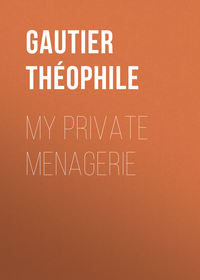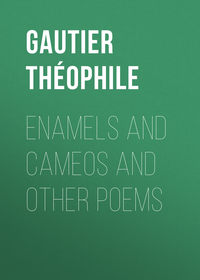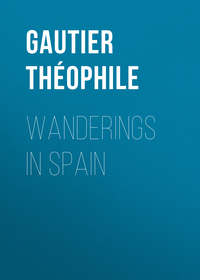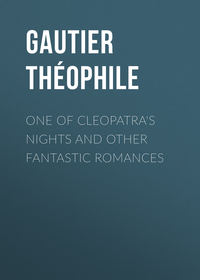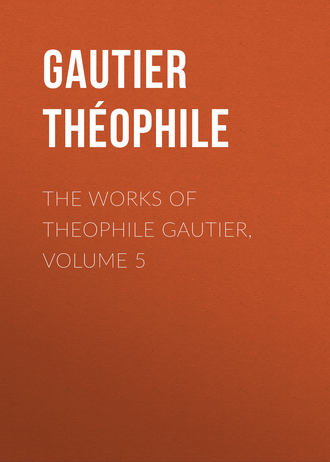 полная версия
полная версияThe Works of Theophile Gautier, Volume 5
She came forward timidly and knelt upon the mat.
"You tell me, Hora, that you can play the lute. Take that instrument hanging upon the wall, strike its cords and sing me some old air, very sweet, very tender, and very slow. The sleep which comes to one cradled by music is full of lovely dreams."
The priest's daughter took down the mandore, drew near the couch on which Poëri was stretched, leaned the head of the lute against the wooden bed-head hollowed out in the shape of a half-moon, stretched her arm to the end of the handle of the instrument, the body of which was pressed against her beating heart, let her hand flutter along the strings, and struck a few chords. Then she sang in a true, though somewhat trembling voice, an old Egyptian air, the vague sigh breathed by the ancestors and transmitted from generation to generation, and in which recurred constantly one and the same phrase of a sweet and penetrating monotony.
"In very truth," said Poëri, turning his dark blue eyes upon the maid, "you know rhythm as does a professional musician, and you might practise your art in the palaces of kings. But you give to your song a new expression; the air you are singing, one would think you are inventing it, and you impart to it a magical charm. Your voice is no longer that of mourning; another woman seems to shine through you as the light shines from behind a veil. Who are you?"
"I am Hora," replied Tahoser. "Have I not already told you my story? Only, I have washed from my face the dust of the road, I have smoothed out the folds in my crushed gown and put a flower in my hair. If I am poor, that is no reason why I should be ugly, and the gods sometimes refuse beauty to the rich. But does it please you that I should go on?"
"Yes. Repeat that air; it fascinates, benumbs me, it takes away my memory like a cup of nepenthe. Repeat it until sleep and forgetfulness fall upon my eyelids."
Poëri's eyes, fixed at first upon Tahoser, soon were half-closed, and then completely so. The maiden continued to strike the strings of the mandore, and sang more and more softly the refrain of her song. Poëri slept. She stopped and fanned him with a palm-leaf fan thrown on the table.
Poëri was handsome, and sleep imparted to his pure features an indescribable expression of languor and tenderness. His long eyelashes falling upon his cheeks seemed to conceal from him a celestial vision, and his beautiful, red, half-open lips trembled as if they were speaking mute words to an invisible being. After a long contemplation, emboldened by silence and solitude, Tahoser, forgetting herself, bent over the sleeper's brow, kept back her breath, pressed her heart with her hand, and placed a timid, furtive, winged kiss upon it. Then she drew back ashamed and blushing. The sleeper had faintly felt in his dream Tahoser's lips; he uttered a sigh and said in Hebrew, "Oh, Ra'hel, beloved Ra'hel!"
Fortunately these words of an unknown tongue conveyed no meaning to Tahoser, and she again took up the palm-leaf fan, hoping yet fearing that Poëri would awake.
VII
When day dawned, Nofré, who slept on a cot at her mistress's feet, was surprised at not hearing Tahoser call her as usual by clapping her hands. She rose on her elbow and saw that the bed was empty; yet the first beams of the sun, striking the frieze of the portico, were only now beginning to cast on the wall the shadow of the capitals and of the upper part of the shafts of the pillars. Usually Tahoser was not an early riser, and she rarely rose without the assistance of her women. Neither did she ever go out until after her hair had been dressed, and perfumed water had been poured over her lovely body, while she knelt, her hands crossed upon her bosom.
Nofré, feeling uneasy, put on a transparent gown, slipped her feet into sandals of palm fibre, and set out in search of her mistress. She looked for her first under the portico of the two courts, thinking that, unable to sleep, Tahoser had perhaps gone to enjoy the coolness of dawn in the inner cloisters; but she was not there.
"Let me visit the garden," said Nofré to herself; "perhaps she took a fancy to see the night dew sparkle on the leaves of the plants and to watch for once the awakening of the flowers."
Although she traversed the garden in every direction, she found it absolutely untenanted. Nofré looked along every walk, under every arbour, under every arch, into every grove, but unsuccessfully. She entered the kiosk at the end of the arbour, but she did not find Tahoser; she hastened to the pond, in which her mistress might have taken a fancy to bathe, as she sometimes did with her companions, upon the granite steps which led from the edge of the basin to the bottom of fine sand. The broad nymphœa-leaves floated on the surface, and did not appear to have been disturbed; the ducks, plunging their blue necks into the calm water, alone rippled it, and they saluted Nofré with joyous cries.
The faithful maid began to feel seriously alarmed; she roused the whole household. The slaves and the maids emerged from their cells, and informed by Nofré of the strange disappearance of Tahoser, proceeded to make most minute search. They ascended the terraces, rummaged every room, every corner, every place where she might possibly be. Nofré, in her agitation, even opened the boxes containing the dresses and the caskets holding the jewels, as if they could possibly have held her mistress. Unquestionably Tahoser was not within the dwelling.
An old and consummately prudent servant bethought himself of examining the sand of the walks in search of the footprints of his young mistress. The heavy bolts of the gate leading into the city were in place, and this proved that Tahoser had not gone out that way. It is true that Nofré had carelessly traversed every path, marking them with her sandals, but by bending close to the ground, old Souhem speedily noticed among Nofré's footprints a slight imprint made by a narrow, dainty sole belonging to a much smaller foot than the maid's. He followed this track, which led him, passing under the arbour, from the pylon in the court to the water gate. The bolts, as he pointed out to Nofré, had been drawn, and the two leaves of the door were held merely by their weight; therefore Petamounoph's daughter had gone out that way. Farther on the track was lost; the brick quay had preserved no trace; the boatman who had carried Tahoser across had not returned to his station; the others were asleep, and when questioned replied that they had seen nothing. One, however, did report that a woman, poorly dressed and belonging apparently to the lowest class, had been ferried over early to the other side of the river to the Memnonia quarter, no doubt to carry out some funeral rite. This description, which in no way tallied with the elegant Tahoser, completely upset the suppositions of Nofré and Souhem.
They returned to the house sad and disappointed. The men and women servants sat down on the ground in desolate attitudes, letting one of their hands hang down, its palm turned up, and placing the other on their head, all of them calling together in plaintive chorus, "Woe! woe! woe! Our mistress is gone!"
"By Oms, the dog of the lower regions, I shall find her," said old Souhem, "even if I have to walk living to the very confines of the Western Region to which travel the dead. She was a kind mistress; she gave us food in abundance, did not exact excessive labour, and caused us to be beaten only when we deserved it and in moderation. Her foot was not heavy on our bowed necks, and in her home a slave might believe himself free."
"Woe! woe! woe!" repeated the men and women as they cast dust upon their heads.
"Alas! dear mistress, who knows where you are now?" said her faithful maid, whose tears were flowing. "Perchance some enchanter compelled you to leave your palace through a spell in order to work his odious will on you. He will lacerate your fair body, will draw your heart out through a cut like that made by the dissectors, will throw your remains to the ferocious crocodiles, and on the day of reunion your mutilated soul will find shapeless remains only. You will not go to join, at the end of the passages of which the undertaker keeps the plan, the painted and gilded mummy of your father, the high-priest Petamounoph, in the funeral chamber which has been cut out for you."
"Calm yourself, Nofré," said old Souhem; "let us not despair too soon. It may be that Tahoser will soon return. She has no doubt yielded to some fancy which we cannot guess, and presently we shall see her come back, gay and smiling, holding aquatic flowers in her hands."
Wiping her eyes with the corner of her dress, the maid nodded assent. Souhem crouched down, bending his knees like those of the dog-faced figures which are roughly carved out of a square block of basalt, and pressing his temples between his dry hands, seemed to reflect deeply. His face of a reddish brown, his sunken eyes, his prominent jaws, the deeply wrinkled cheeks, his straight hair framing in his face like bristles, made him altogether like the monkey-faced gods. He was certainly not a god, but he looked very much like a monkey.
The result of his meditations, anxiously awaited by Nofré, was thus expressed: "The daughter of Petamounoph is in love."
"Who told you?" cried Nofré, who thought that she was the only one who could read her mistress's heart.
"No one; but Tahoser is very beautiful; she has already beheld sixteen times the rise and fall of the Nile. Sixteen is the number symbolical of voluptuousness; and for some time past she has been calling at unaccustomed hours her players on the harp, the lute, and the flute, like one who seeks to calm the agitation of her heart by music."
"You speak sensibly, and wisdom dwells in your old bald head. But how have you learned to know women, – you who merely dig the earth in the garden and bear jars of water on your shoulders?"
The slave opened his lips with a silent smile and exhibited two rows of teeth fit to crush date-stones. The grin meant, "I have not always been old and a captive."
Enlightened by Souhem's suggestion, Nofré immediately thought of the handsome Ahmosis, the oëris of the Pharaoh, who so often passed below the terrace, and who had looked so splendid on his war chariot in the triumphal procession. As she was in love with him herself, though she was not fully aware of it, she assumed that her mistress shared her feelings. She put on a somewhat heavier dress and repaired to the officer's dwelling. It was there, she fancied, that Tahoser would certainly be found.
The young officer was seated on a low seat at the end of the room. On the walls hung trophies of different weapons: the leather tunic covered with bronze plates on which was engraved the cartouche of the Pharaoh; the brazen poniard, with the jade handle open-worked to allow the fingers to pass through; the flat-edged battle-axe, the falchion with curved blade; the helmet with its double plume of ostrich-feathers; the triangular bow; and the red-feathered arrows. His distinctive necklaces were placed upon pedestals, and open coffers showed booty taken from the enemy.
When he saw Nofré, whom he knew well, standing on the threshold, he felt quick pleasure, his brown cheeks flushed, his muscles quivered, his heart beat high. He thought Nofré brought him a message from Tahoser, although the priest's daughter had never taken notice of his glances; but the man to whom the gods have imparted the gift of beauty easily fancies that all women fall in love with him. He rose and took a few steps towards Nofré, whose anxious glance examined the corners of the room to make sure whether Tahoser was there or not.
"What brings you here, Nofré?" said Ahmosis, seeing that the young maid, full of her search, did not break silence. "Your mistress is well, I hope, for I think I saw her yesterday at the Pharaoh's entry."
"You should know whether my mistress is well better than any one else," replied Nofré; "for she has fled from her home without informing any one of her intentions. I could swear by Hathor that you know the refuge which she chose."
"She has disappeared! – what are you talking about?" cried Ahmosis, with a surprise that was unquestionably genuine.
"I thought she loved you," said Nofré, "and sometimes the best-behaved maidens lose their heads. So she is not here?"
"The god Phrah, who sees everything, knows where she is, but not one of his beams, which end in hands, has fallen on her within these walls. Look for yourself and visit every room."
"I believe you, Ahmosis, and I must go; for if Tahoser had come, you could not conceal it from her faithful Nofré, who would have asked nothing better than to serve your loves. You are handsome; she is very rich and a virgin; the gods would have beheld your marriage with pleasure."
Nofré returned to the house more anxious and more upset than before. She feared that the servants might be suspected of having killed Tahoser in order to seize on her riches, and that the judges would seek to make them confess under torture what they did not actually know.
The Pharaoh, on his part, was also thinking of Tahoser. After having made the libations and the offerings required by the ritual, he had seated himself in the inner court of the harem, and was sunk in thought, paying no attention to the gambols of his women, who, nude and crowned with flowers, were disporting themselves in the transparent waters of the piscina, splashing each other and uttering shrill, sonorous bursts of laughter, in order to attract the attention of the master, who had not made up his mind, contrary to his habit, which of them should be the favourite queen that week.
It was a charming picture which these beautiful women presented; in a framework of shrubs and flowers, in the centre of the court, surrounded by columns painted in brilliant colours, in the clear light of an azure sky, across which flew from time to time an ibis with outstretched neck and trailing legs, their shapely bodies shone in the water like submerged statues of jasper.
Amense and Twea, weary of swimming, had emerged from the water, and kneeling on the edge of the basin, were spreading out to dry in the sun their thick black hair, the long locks of which made their white skins seem whiter still. A few last drops of water ran down their shining shoulders and their arms polished like jade. Maids rubbed them with aromatic oil and essences, while a young Ethiopian girl held out the calyx of a large flower so that they might breathe its perfume.
It might have been thought that the artist who had carved the decorative bassi-relievi of the rooms in the harem had taken these graceful groups as models; but the Pharaoh could not have looked with a colder glance at the designs cut in the stone. Perched on the back of his armchair the tame monkey was eating dates and cracking its jaws; against the master's legs the tame cat rubbed itself, arching its back; the deformed dwarf pulled the monkey's tail and the cat's moustaches, making the one scratch and the other chatter, a performance which usually caused His Majesty to smile; but His Majesty was not in a smiling mood on that day. He put the cat aside, made the monkey get off the armchair, smote the dwarf on the head, and walked toward the granite apartments.
Each of those rooms was formed of blocks of prodigious size, and closed by stone gates which no human power could have forced unless the secret of opening them were known. Within these halls were kept the riches of the Pharaoh, and the booty taken from conquered nations. They held ingots of precious metals, crowns of gold and silver, neckplates and bracelets of cloisonné enamel, earrings which shone like the disc of Moui, necklaces of seven rows of cornelian, lapis-lazuli, red jasper, pearls, agates, sardonyx, and onyx; exquisitely chased anklets, belts, with plates engraved with hieroglyphs, rings with scarabæi set in them; quantities of fishes, crocodiles, and hearts stamped out of gold, serpents in enamel twisted on themselves; bronze vases, flagons of wavy alabaster, and of blue glass on which wound white spirals; coffers of enamelled ware; boxes of sandal wood of strange and chimerical forms; heaps of aromatic gums from all countries; blocks of ebony; precious stuffs so fine that a whole piece could have been pulled through a ring; white and black ostrich plumes, and others coloured in various ways; monstrously huge elephant's-tusks, cups of gold, silver, gilded glass; statues marvellous both as regards the material and the workmanship.
In every room the Pharaoh caused to be taken a litter-load borne by two robust slaves of Kousch and Scheto, and clapping his hands, he called Timopht, the servant who had followed Tahoser, and said to him, "Have all these things taken to Tahoser, the daughter of the high-priest Petamounoph, from the Pharaoh."
Timopht placed himself at the head of the procession, which crossed the Nile on a royal barge, and soon the slaves with their load reached Tahoser's house.
"For Tahoser, from the Pharaoh," said Timopht, knocking at the door.
At the sight of those treasures Nofré nearly fainted, half with fear, half with amazement. She dreaded lest the King should put her to death on learning that the priest's daughter was no longer there.
"Tahoser has gone," said she, tremulously, "and I swear by the four sacred geese, Amset, Sis, Soumauts, and Kebhsniv, which fly to the four quarters of the wind, that I know not where she is."
"The Pharaoh beloved of Phré, favourite of Ammon Ra, has sent these gifts, – I cannot take them back. Keep them until Tahoser is found. You shall answer for them on your head. Have them put away in rooms and guarded by faithful servants," replied the envoy of the King.
When Timopht returned to the palace and, prostrate, his elbows close to his sides, his brow in the dust, said that Tahoser had vanished, the King became very wroth, and he struck the slab of the flooring so fiercely with his sceptre that the slab was split.
VIII
Tahoser, nevertheless, scarce bestowed a thought on Nofré, her favourite maid, or on the anxiety which her absence would necessarily cause. The beloved mistress had completely forgotten her beautiful home in Thebes, her servants, and her ornaments, – a most difficult and incredible thing in a woman. The daughter of Petamounoph had not the least suspicion of the Pharaoh's love for her; she had not observed the glance full of desire which had fallen upon her from the heights of that majesty which nothing on earth could move. Had she seen it, she would have deposited the royal love as an offering, with all the flowers of her soul, at the feet of Poëri.
While driving her spindle with her toe to make it ascend along the thread, – for this was the task which had been set her, – she followed with her glance every motion of the young Hebrew, her looks enveloped him like a caress. She silently enjoyed the happiness of remaining near him in the building to which he had given her access.
If Poëri had turned towards her, he would no doubt have been struck by the moist brilliancy of her eyes, the sudden blushes which flushed her fair cheeks, the quick beating of her heart which might be guessed by the rising and falling of her bosom; but seated at a table, he bent over a leaf of papyrus on which, with the help of a reed, taking ink from a hollowed slab of alabaster, he inscribed accounts in demotic numbers.
Did Poëri perceive the evident love of Tahoser for him? Or for some secret reason, did he pretend not to perceive it? His manner towards her was gentle and kindly, but reserved, as if he sought to prevent or repel some importunate confession which it would have given him pain to reply to. And yet the sham Hora was very beautiful. Her charms, betrayed by the poverty of her dress, were all the more beautiful; and just as in the hottest hours of the day a luminous vapour is seen quivering upon the gleaming earth, so did an atmosphere of love shimmer around her. On her half-open lips her passion fluttered like a bird that seeks to take its flight; and softly, very softly, when she was sure that she would not be heard, she repeated like a monotonous cantilena, "Poëri, I love you."
It was harvest time, and Poëri went out to oversee the workmen. Tahoser, who could no more leave him than the shadow can leave the body, followed him timidly, fearing lest he should tell her to remain in the house; but the young man said to her in a voice marked by no accent of anger, —
"Grief is lightened by the sight of the peaceful work of agriculture, and if some painful remembrance of vanished prosperity weighs down your soul, it will disappear at the sight of this joyous activity. These things must be novel to you, for your skin, which the sun has never kissed, your delicate feet, your slender hands, and the elegance with which you drape yourself in the piece of coarse stuff which serves you for a vestment, prove to me that you have always inhabited cities, and have lived in the midst of refinement and luxury. Come, then, and sit down, while still turning your spindle, under the shadow of that tree, where the harvesters have hung up, to keep it cool, the skin which holds their drink."
Tahoser obeyed and sat down under the tree, her arms crossed on her knees and her knees up to her chin. From the garden wall, the plain stretched to the foot of the Libyan chain like a yellow sea over which the least breath of air drove waves of gold. The light was so intense that the golden tone of the grain whitened in places and became silvery. In the rich mud of the Nile the grain had grown strong, straight, and high like javelins, and never had a richer harvest, flaming and crackling with heat, been outspread in the sun. The crop was abundant enough to fill up to the ceiling the range of vaulted granaries which rose near the cellars.
The workmen had already been a long while at work, and here and there out of the waves of the corn showed their woolly or close-shaven heads covered with pieces of white stuff, and their naked torsos the colour of baked brick. They bent and rose with a regular motion, cutting the grain just below the ear, as regularly as if they had followed a line marked out by a cord. Behind them in the furrows walked the gleaners with esparto bags, in which they placed the harvested ears, and which they then carried on their shoulders, or suspended from a cross-bar and with the help of a companion, to grinding-mills situated some distance apart. Sometimes the breathless harvesters stopped to take breath, and putting their sickles under their right arm drank a draught of water. Then they quickly resumed their work, fearing the foreman's stick.
The harvested grain was spread on the threshing-floor in layers evened with a pitchfork, and slightly higher on the edges on account of the additional basketfuls which were being poured on.
Then Poëri signed to the ox-driver to bring on his animals. They were superb oxen with long horns, curved like the head-dress of Isis, with high withers, deep dewlaps, clean, muscular limbs; the brand of the estate, stamped with a red-hot iron, showed upon their flanks. They walked slowly, bearing a horizontal yoke which bore equally upon the heads of the four.
They were driven on to the threshing-floor; urged by the double-lashed whip, they began to trample in a circle, making the grain spring from the ear under their cloven hoofs; the sun shone on their lustrous coats, and the dust which they raised ascended to their nostrils, so that after going around about twenty times, they would lean one against another, and in spite of the hissing whip which lashed their flanks, they would unmistakably slacken their pace. To encourage them, the driver who followed them, holding by the tail the nearest animal, began to sing in a joyous, quick rhythm the old ox-song: "Turn for yourselves, O oxen, turn for yourselves; measures for you, and measures for your masters." And the team, with new spirit, started on and disappeared in a cloud of yellow dust that sparkled like gold.
The work of the oxen done, came servants who, armed with wooden scoops, threw the grain into the air and let it fall to separate it from the straw, the awn, and the shell. The grain thus winnowed was put into bags, the numbers of which were noted by a scribe, and carried to the lofts, which were reached by ladders.
Tahoser under the shadow of her tree enjoyed this animated and grandiose spectacle, and often her heedless hand forgot to spin the thread. The day was waning, and already the sun, which had risen behind Thebes, had crossed the Nile and was sinking towards the Libyan chain, behind which its disc sets every evening. It was the hour when the cattle returned from the fields to the stable. She watched near Poëri the long pastoral procession.


